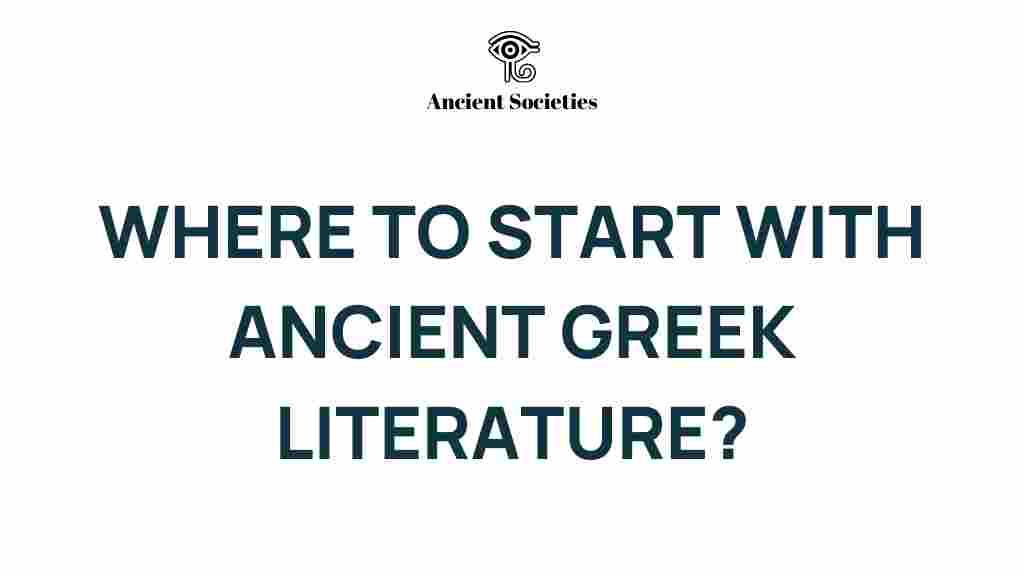Unlocking the Treasures of Ancient Greek Literature
Ancient Greek literature is a profound treasure trove that has shaped Western culture, philosophy, and artistic expression. From the epic tales of Homer to the intricate tragedies of Sophocles and the philosophical discourses of Plato, the classics offer insights into human nature, morality, and the complexities of life. Whether you are a student, a casual reader, or a lover of literature, this guide will help you navigate the rich landscape of Ancient Greek literature and understand its lasting cultural impact.
Understanding the Foundations of Ancient Greek Literature
To fully appreciate Ancient Greek literature, it is essential to understand its historical and cultural context. The literature emerged during a time when Greek city-states were flourishing, fostering an environment ripe for artistic and intellectual pursuits. Key genres of Ancient Greek literature include:
- Epics: Long narrative poems celebrating heroic deeds, with Homer’s Iliad and Odyssey being the most notable examples.
- Tragedy: A dramatic genre that explores profound themes often resulting in catharsis. Major playwrights include Aeschylus, Sophocles, and Euripides.
- Comedy: This genre offers a lighter, often satirical perspective on society, with Aristophanes leading the way.
- Philosophy: Works by philosophers such as Plato and Aristotle that delve into ethics, politics, and metaphysics.
- Poetry: Aside from epics, lyric poetry flourished, with poets like Sappho and Pindar making significant contributions.
These genres not only reflect the diverse storytelling traditions of ancient Greece but also their societal values, norms, and beliefs.
Where to Begin Your Journey into Ancient Greek Literature
Starting your exploration of Ancient Greek literature can be overwhelming given the vast array of works available. Here’s a step-by-step process to guide you through your journey:
1. Begin with the Epics
Homer’s epics are a fantastic starting point. The Iliad depicts the events of the Trojan War, focusing on themes of honor, pride, and mortality. The Odyssey follows Odysseus’s long journey home, exploring themes of loyalty, perseverance, and the human experience.
2. Explore Tragedy
After engaging with the epics, immerse yourself in Greek tragedies. Start with:
- “Oedipus Rex” by Sophocles: A powerful tale of fate and self-discovery.
- “Medea” by Euripides: A gripping story of betrayal and revenge.
- “Agamemnon” by Aeschylus: The first play in the Oresteia trilogy that deals with themes of justice and vengeance.
3. Delve into Philosophy
Once you have grasped the narratives of the epics and tragedies, turn to philosophical texts. Key works include:
- Plato’s “The Republic”: A foundational text in Western philosophy discussing justice and the ideal state.
- Aristotle’s “Nicomachean Ethics”: A treatise on ethics and the path to achieving the good life.
4. Enjoy Lyric Poetry
Poets such as Sappho and Pindar offer a more personal glimpse into human emotions and experiences. Sappho’s fragments express deep feelings of love and longing, while Pindar’s odes celebrate athletic victories and divine favor.
Additional Resources for Exploring Ancient Greek Literature
To deepen your understanding, consider the following resources:
- Online Courses: Platforms like Coursera and edX offer courses on Greek literature and philosophy.
- Books: Look for annotated editions of classic texts to provide context and commentary.
- Podcasts and Lectures: Many universities provide free lectures and podcasts that discuss Greek literature and its relevance today.
For more structured learning, check out this comprehensive guide on studying classics.
Troubleshooting Common Issues When Reading Ancient Greek Literature
As you delve into Ancient Greek literature, you may encounter some challenges. Here are common issues and how to overcome them:
1. Language Barrier
Many texts are available in translation, but some nuances may be lost. To appreciate the original text, consider reading parallel translations—Greek on one side, English on the other.
2. Cultural References
Many works contain references to Greek mythology and societal norms that may not be familiar. Researching these references can enrich your understanding. Use annotated editions that explain these cultural contexts.
3. Complex Themes and Philosophical Ideas
The themes and ideas explored can be abstract and complex. Take your time and don’t hesitate to read secondary literature or analysis to gain different perspectives on the texts.
The Cultural Impact of Ancient Greek Literature
The influence of Ancient Greek literature on Western culture is immeasurable. Here are some key areas of impact:
- Literature and Drama: The structure of modern novels and plays is deeply influenced by Greek storytelling techniques.
- Philosophy: Many philosophical concepts and schools of thought in Western philosophy trace their roots back to ancient Greek thinkers.
- Art and Rhetoric: Greek literature has shaped artistic representation and rhetorical techniques throughout history.
Understanding this impact can enhance your appreciation of not just Ancient Greek literature, but also the broader landscape of literary heritage.
Conclusion: Embracing the Legacy of Ancient Greek Literature
Unlocking the treasures of Ancient Greek literature is a rewarding journey that provides insight into the human condition, societal structures, and philosophical inquiries that resonate to this day. By starting with the epics of Homer, exploring tragedies, and engaging with philosophical texts, you will gain a deeper understanding of this literary heritage.
As you embark on this journey, remember that the cultural impact of Ancient Greek literature extends far beyond its historical context, influencing countless aspects of modern life. Embrace this legacy, and let the words of ancient poets, playwrights, and philosophers inspire and challenge your thoughts.
For more insights into the world of literature, visit this resource page for additional reading materials and discussions.
This article is in the category Culture and created by AncientSocieties Team
